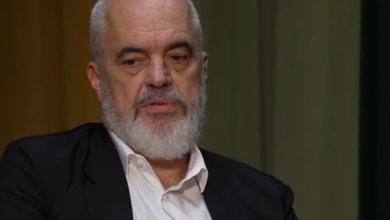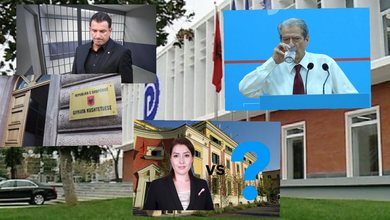
Erion Veliaj has filed a request with the Constitutional Court, challenging the decision to dismiss him from office as Mayor of Tirana.
He argues that Article 62 of the Law on Local Self-Government cannot be used as an independent basis for dismissal, but must be interpreted in accordance with Article 115 of the Constitution. According to Veliaj, a mayor can only be dismissed for “serious violation of the Constitution or laws”, which in his case does not exist, as the three-month absence was the result of an objective inability (detention), not a voluntary choice.
He emphasizes that the continuity of the function was guaranteed through the delegation of powers to the deputy mayor, so there was no harm to the institution. Veliaj warns that accepting an expanded interpretation of Article 62 would create a dangerous precedent, allowing political interference in the locally elected mandate. “The Constitution is above the law and cannot be replaced by casual interpretations,” he emphasizes in the request.
Veliaj was dismissed from the council with the argument that he had been absent from duty for 3 months. Tirana Mayor Erion Veliaj is facing 13 criminal charges and today the Special Court is expected to begin reviewing the file in a preliminary session.
Request passages:
1. Based on Article 115 of the Constitution, the Mayor may be dismissed for serious violations of the Constitution or laws and may appeal to the Constitutional Court within 15 days, an appeal which suspends the effects of the decision of the Council of Ministers. (see decisions no. 15, dated 08.06.2009; no. 22, dated 07.10.2008; no. 39, dated 29.12.2005 of the Constitutional Court) Based on this constitutional provision, through the provisions of Law no. 139/2015 “On Local Self-Government”, the legislator has considered specifying two cases of what will be considered a serious violation of the Constitution and laws, through the provisions of letters “b” and “c” of Article 62 of this law, if the Mayor: is convicted of committing a criminal offense, by a final decision, by the court; does not appear in office for an uninterrupted period of 3 months. The legislator itself has determined that this law has also been issued on the basis of and for the implementation of Article 115 of the Constitution. For this reason, the dismissal of the mayor is within the constitutional jurisdiction. A conciliatory interpretation is possible when a law or legal provision can be interpreted in more than one way, one of which is in accordance with the Constitution. This method seeks the constitutional effects of different outcomes and selects the outcome that is in accordance with constitutional values, taking into account the fundamental rights of individuals. (Decision no. 29, dated 31.05.2010 of the Constitutional Court) A conciliatory interpretation is possible when a law or legal provision can be interpreted in more than one way, one of which is in accordance with the Constitution. (Decision no. 5 dated 16.02.2012) Therefore, no other interpretation of the provisions is constitutionally permissible and the protection of the aforementioned constitutional rights and principles cannot be achieved if these contested provisions are given a different meaning. (Decision no. 54 dated 09.07.2024 of the Constitutional Court)
2. The legislator, with Article 62 of Law No. 139/2015, did not intend to create a new category of dismissal independent of the Constitution, but only to specify some concrete cases that constitute “serious violations of the Constitution or laws”, according to Article 115 of the Constitution. This is clearly understood from the way the provision is constructed: the letters “b” and “c” do not go beyond the constitutional logic, but serve to decompose and concretize the notion of “serious violation”. For example, criminal punishment by final decision (letter “b”) is a typical form of serious violation of the law/constitution for an official such as the Mayor; while failure to appear at work for three months (letter “c”) constitutes a serious violation if the Mayor, without any objective reason, has chosen of his own free will not to exercise his function. On the contrary, when the absence is the result of an objective impossibility or extraordinary circumstances that make it impossible to exercise the function, it cannot be considered a “serious violation”, because the law would be extended beyond the constitutional framework of Article 115.
3. If the opposite were accepted, then we would be dealing with an unconstitutional legal norm, since the legislator would have added a new reason for the dismissal of the Mayor, although the constitution-maker, in order to guarantee maximum local autonomy, has expressly and in a limited manner defined in the Constitution the reason for the dismissal of the Mayor and has not given authorization for the expansion of the reasons for dismissal by law. The jurisprudence of this Court itself has considered in contradiction with the Constitution, by repealing, the legal provisions that have exceeded and without authorization the constitutional provisions.
4. Often, the Constitution intentionally leaves room for regulation by the ordinary legislator, so as not to hinder the taking of political, economic, social and cultural initiatives by political parties or the government. However, the Constitution, in addition, can provide in detail and expressly for cases for which it cannot leave room for regulation by the ordinary legislator. The Constitutional Court has emphasized that “in any case, when the constitutional regulation is expressly provided for by it, it shall be directly applied. The content of the constitutional provision cannot be removed or exceeded by giving priority to legal acts that arise on the basis and for the implementation of the Constitution”. This obligation derives from the content of Article 4/3 of the Constitution and is a consolidated position of the Constitutional Court in other analogous cases, in which it has emphasized that “what the Constitution did not want to do, the law cannot do. Therefore, it cannot be accepted that it has omitted without mentioning such cases”. For this reason, if it were claimed that the law has provided for a new reason for dismissal, then the principle of the rule of law, expressed in the priority of the norms of the Constitution in relation to other legal norms, would be affected.
5. Article 115 of the Constitution is a norm with a restrictive character for the competence of the Council of Ministers: the latter may dismiss the mayor only when there is a “serious violation of the Constitution or the laws”. This is a guarantee that the Constitution gives to the locally elected mandate, to protect it from arbitrary interference by the central government. If the legislator were allowed to add other grounds for dismissal, beyond those deriving from this article, the protective function of Article 115 would be destroyed, reducing it to an empty provision. If the opposite were accepted, then the mayors of municipalities would be defenseless against unilateral interference by the central government, while the Constitution has intended to guarantee exactly the opposite: that their mandate is violated only in exceptional cases, when it is proven that there has been a serious violation of the constitutional or legal order. This is the only interpretation that preserves the coherence of the hierarchy of norms, legal certainty and the right of citizens to be governed by the representative they have chosen. If article 62, letter “c” of law no. 139/2015 were to be understood as a new ground for dismissal, independent of the Constitution, then, contrary to the constitutional jurisprudence to date, we would have to accept that mayors no longer enjoy constitutional protection in the process of their dismissal. This would lead to a decline in their status from democratically elected and constitutionally protected bodies, to ordinary administrative functionaries, who can be dismissed on the basis of criteria not authorized by the Constitution and unilaterally established by the legislator. This result would subvert the principle of local autonomy sanctioned in the Constitution and in the European Charter of Local Self-Government.
6. Since the Constitution itself has defined the reasons for which the mayor may be dismissed, and has not authorized the legislator to add other reasons for dismissal, any case of termination of his mandate remains directly linked to Article 115 of the Constitution. This norm is constructed as a special constitutional guarantee, which not only limits the competence of the Council of Ministers, but also raises a barrier against any attempt to relativize the local elected mandate through the interventions of the legislator. Therefore, any attempt to read Article 62 of Law No. 139/2015 as creating a new category of dismissal outside the constitutional framework would in itself be an interpretation that cannot be made, because it is an unconstitutional interpretation, which conflicts with the principle of the supremacy of the Constitution and with the protective function that it recognizes for the local elected mandate.
7. In this logic, the Constitutional Court is always competent to examine requests aimed at the annulment of decisions of the Council of Ministers on the dismissal of mayors. To accept the opposite would mean that through a legal or sub-legal act, the Constitutional Court could be stripped of the powers that the Constitution itself has granted it, which would overturn the hierarchy of sources of law and would pave the way for the instrumentalization of the law as a means to circumvent constitutional control. In essence, instruments cannot be used that use unconstitutional interpretations of legal provisions, claiming the existence of new grounds for dismissal, beyond the constitutional ones, with the aim of achieving a result that the Constitution has not foreseen. Such an approach, in addition to being unacceptable in a state of law, would undermine the very function of the Constitutional Court as a guarantor of the constitutional order and constitutional principles, such as the separation of powers.
8. Based on Article 115/2 of the Constitution, the dismissed body may appeal within 15 days to the Constitutional Court. The Constitutional Court has stated that the date of commencement of the appeal period against an individual act that violates the rights of the person shall be considered the date of receipt of knowledge by the person of the existence of the act, regardless of other forms of publication (decision no. 37, dated 25.07.2013 of the Constitutional Court). If the applicant claims that he/she did not receive prior knowledge of the dismissal decision, therefore, the date of receipt of knowledge shall be considered to be 17.05.2016, the date of publication of the dismissal decision in the Official Gazette. (decision no. 67, dated 11.11.2016 of the Constitutional Court) As will be argued extensively below, the applicant has been violated in a number of constitutional rights as a result of the decision under trial and has raised claims related to the procedure and criteria for his dismissal from office, as a result, within the 15-day deadline, he is also legitimate ratione temporis in presenting this request before the Constitutional Court.
9. Local autonomy is essentially violated when the central government terminates an elected mandate without relying on a reason provided for by the Constitution and the law enacted in its implementation. Article 115 of the Constitution allows dismissal only for “serious violations of the Constitution or laws”, while Article 62 of the Law on Local Self-Government, interpreted in accordance with Article 115 of the Constitution on the basis of which and for the implementation of which it was enacted, concretizes this standard, including the case of 3-month absence, without objective reasons. In our case, the absence stems from an objective impossibility (detention), therefore it does not fall under the hypothesis of Article 62, letter “c”. By treating this objective absence as a “reason for dismissal”, the Council of Ministers has applied a new criterion, which is not found in any legal provision. This deviation transforms the guarantee of Article 115 of the Constitution from an extraordinary filter of legality into a tool of political discretion, violating the principle of local autonomy.
10. The expanded interpretation of Article 62, letter “c” to include absence with objective reasons bypasses the constitutional interpretation of the norm, relativizing the elected mandate and its constitutional guarantees. In the representative plan, the use of an unforeseen criterion replaces the local electoral will with the central administrative will, without legal basis. In reality, Law No. 139/2015 itself provides that it has been issued on the basis and for the implementation of Article 115 of the Constitution. Therefore, the law has no independent existence and cannot be understood outside the constitutional framework that generated it. By using this article as if it were an autonomous basis to legitimize dismissal, according to this decision of the Council of Ministers, instead of the Constitution authorizing the law, it is the law that has replaced the Constitution. This inverse is the clearest violation of the hierarchy of sources of law, because it implies that a lower-ranking norm is defining and replacing the scope of the higher-ranking norm.
11. If this approach were accepted, a dangerous precedent would be created: any subsequent legal provision, instead of being implemented in accordance with the Constitution, could be used as a basis to bypass or relativize constitutional provisions. This would eliminate the function of the Constitution as a supreme act, transforming it into a declaratory document without real restrictive power over powers. Such a situation would undermine not only the principle of the rule of law, but also the guarantees of local self-government, because the elected mandate would no longer be protected by the Constitution, but would be dependent on the occasional interpretation of an ordinary law or an act of the executive. Constitutional jurisprudence has emphasized that the principle of the rule of law obliges all organs of public power to exercise their powers only within the framework and on the basis of constitutional norms.
12. The Council of Ministers, at the head of the dismissal decision, has cited as legal basis only Article 100 of the Constitution and Article 62 of the Law on Local Self-Government, as if these provisions were sufficient to justify its competence. With this approach, it will claim before this Court that the act was not issued on the basis of Article 115 of the Constitution. But such a claim is completely unfounded. The Constitution, as the highest act of the legal order, has expressly determined in which cases the Mayor may be dismissed. In the absence of a constitutional authorization, the legislator cannot add other cases of dismissal that are not included in this provision and that the Constitution has not authorized the legislator to do. Moreover, even if we refer to Article 62 of the Law on Local Self-Government, the latter itself provides that it was issued “on the basis of and for the implementation of Article 115 of the Constitution”, therefore it cannot be understood or applied separately from Article 115, which is the only constitutional source of the power to dismiss an elected local body.
13. Article 62 of the Law on Local Self-Government cannot be understood, much less used, as an independent basis, as if it itself created the power to dismiss. Any interpretation of it must necessarily pass through Article 115, because it is this article that gives meaning, limits and constitutionality to the legal provision. Using only Article 62 as a basis for dismissal, without directly linking it to the criterion of “serious violation” of the Constitution, is a formal deviation from the constitutional guarantee, treating the ordinary law as an independent source of competence for something that the Constitution has explicitly foreseen and linked to clear conditions. It is impossible to justify an act of dismissal entirely on the basis of Article 62, because this Article cannot stand above the Constitution, but must be read in accordance with it.
14. The absence of the Mayor, due to an objective inability caused by detention, does not meet the constitutional criterion of “serious violation”. Article 62, interpreted together with Article 115 of the Constitution, provides for absence as a reason for dismissal only when it is unjustified, that is, when it stems from the will of the person, because only in this case can the absence constitute a “serious violation”, not when the absence is due to objective reasons, independent of the will of the official. In the case of the Mayor of Tirana, the absence was the result of a security measure, that is, an objective impossibility, and moreover, the continuity of the function was ensured through the application of Article 64 of the same law, through the appointment by the Mayor of the Deputy Mayor who would exercise the powers of the Mayor. Therefore, there was no “serious violation” in essence, which makes the act not only unfounded in the constitution, but also materially unsupported in the concrete circumstances.
15. In this light, the mention of Article 100 and Article 62, leaving out Article 115, is not simply a formal omission: it is an attempt to justify a competence that does not exist, by going through a general norm and an implementing norm, without going through the only constitutional gate that authorizes such an extreme measure. This is a direct violation of the hierarchy of sources of law and clear evidence that the decision was issued in excess of the competence granted by the Constitution. In the specific case, the applicant was not faced with such a lack voluntarily chosen by him, but with an objective situation imposed by a personal security measure, imposed by the court. Detention, as a temporary measure of criminal procedure, is not proof of guilt, is not a sanction and is not an indication of a negligent or unlawful attitude of the public official. On the contrary, it is an external situation, independent of his will, which prevented him from personally exercising his functions, but which did not make the office vacant: in accordance with article 64, letter “e” of law no. 139/2015, he had appointed the deputy mayor to exercise his powers, thus guaranteeing the continuity of the public service and not leaving the institution in a vacuum. So, even in this practical aspect, the serious consequence for the citizens and the institution that the law wanted to prevent when it sanctioned the three-month absence was not created. By treating this objective impossibility as if it were a voluntary absence, the Council of Ministers has expanded the scope of article 62 beyond what the Constitution allows.






















